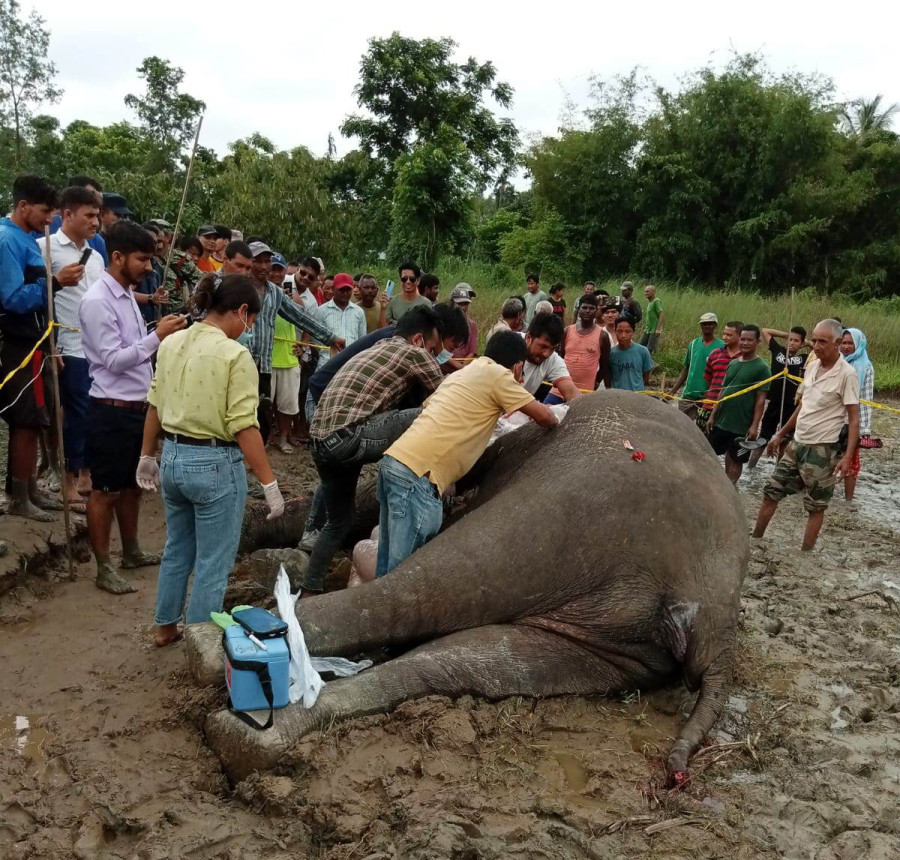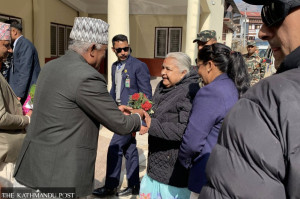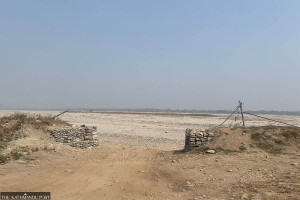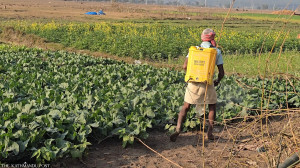Koshi Province
Frequent deaths of wild elephants in Jhapa worry conservationists
Experts say human-wildlife conflict has risen because of encroachment of the bio-corridor by humans over the years.
Parbat Portel
An elephant estimated to be around 30 years old was found dead near the Dahijoda forest area of Arjundhara Municipality-4 in Jhapa on July 6.
According to the Division Forest Office, Jhapa, the cause of the elephant’s death has not been ascertained but conservationists suspect electrocution since there were no visible signs of injuries on the body.
Conservationist Shankar Luitel, who visited the site where the elephant was found dead, believes that the elephant died of electrocution.
“During my on-site visit, I saw electric wires scattered around the place where the elephant lay dead,” he said. “The actual cause of death can only be determined after the postmortem reports are in but my suspicions are strong in this case.”
There are about a dozen native elephants in Jhapa. Luitel claims that the elephant killed on Wednesday was not a native but came from India.
This is not the first incident of elephant death reported in Jhapa this month. On July 1, an elephant estimated to be around seven years old was found dead in Aayabari village about 500 meters south of the Panchpokhari forest area in Buddhashanti Rural Municipality-5.
Elephants enter the villages spread around the forest areas to eat crops. To prevent elephants from entering the fields, the local farmers install electric fences around the perimeter of their land. This is one of the main causes behind the high number of elephant deaths in the area, say conservationists.
The Division Forest Office in Jhapa says the bodies of both the elephants have been sent for postmortem.
“The cause of their deaths can only be confirmed after the postmortem report,” said Acting Division Forest chief Raj Kumar Khatri. “We are still awaiting the postmortem result of the elephant that was found dead on July 1.”
Studies show that elephants from Assam and West Bengal in India travel to Koshi Tappu Wildlife Reserve in Nepal through Bahundangi. Experts say that instances of human-wildlife conflict are recurring because of the encroachment of the bio-corridor by humans over the years. There are around 1,800 households in Bahundangi.
Dr Narendra Pradhan, an expert on elephants, said that the conflict between humans and elephants has been going on for a long time in Jhapa, where both have suffered.
According to the Division Forest Office, Jhapa, 53 people have died in elephant attacks while 13 elephants have been killed in the last ten years.
“Elephants are intelligent animals. They do not attack for fun. People need to stop killing and torturing them,” Pradhan told the Post. “The conflict between elephants and humans could go on forever if we don’t think about ways to help the animal protect their way of life and their right of way. The responsibility to reduce this conflict is not in the hands of elephants but falls on us humans.”
The International Union for Conservation of Nature (IUCN) has banned the killing of elephants or any kind of physical abuse of the animal species. But very few people living in areas prone to human-wildlife conflict abide by international law.
Due to the complexity of the issue of whether to save people or elephants, the concerned bodies and the general public do not take the issue of elephant deaths seriously, says conservationist Dr Shantaraj Gyawali.
“The death of an elephant should be taken as seriously as that of a human,” he said. “When a human settlement moves into an area used by elephants as bio-corridors, the likelihood of human-animal conflict increases. The authorities should find ways to prevent confrontations between humans and elephants by protecting bio-corridors from human encroachment.”
On October 30, 2020, a wild elephant was found dead in the Pachpokhari Community Forest Area of Buddhashanti Rural Municipality-5, Jhapa.
The Division Forest Office, Jhapa, had suspected the locals’ involvement in the death of the elephant since it had several wounds inflicted by sharp weapons on its body. But no further investigation into the case was initiated.
According to the Nepal Law Commission, if an elephant dies for any reason, the forest officer of the area should conduct the necessary investigation and order the funeral of the elephant. However, investigation teams are rarely formed.
“I don’t think the forest office has carried out any serious investigation into the death of an elephant,” said conservationist Luitel.
Although many people have been prosecuted in the forest office for killing animals like spotted deer, deer and other wild animals, no one has been dragged to court for killing elephants so far.
“I have never seen a case that got registered for killing elephants,” said Assistant Forest Officer Kul Prasad Bhattarai.
According to the National Parks and Wildlife Conservation Act, two dozen wild animals, including elephants, are on the protected list of the country.
The guilty can face imprisonment for 3 to 10 years or more for killing animals on the protected list.
According to Luitel, the human-elephant conflict has been going on in Jhapa for about 50 years. “Both humans and elephants are dying every year,” Luitel said. “The government needs to get serious about how to protect both.”




 23.12°C Kathmandu
23.12°C Kathmandu













